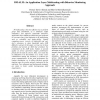Free Online Productivity Tools
i2Speak
i2Symbol
i2OCR
iTex2Img
iWeb2Print
iWeb2Shot
i2Type
iPdf2Split
iPdf2Merge
i2Bopomofo
i2Arabic
i2Style
i2Image
i2PDF
iLatex2Rtf
Sci2ools
ISM
2006
IEEE
2006
IEEE
BM-ALM: An Application Layer Multicasting with Behavior Monitoring Approach
IP multicasting is the most efficient way to perform group data distribution, as it eliminates traffic redundancy and improves bandwidth utilization. Application Layer Multicast (ALM) has been proposed to overcome some of the limitations in IP multicasting such as scalability and deploy-ability. Limited computing power, scarcity of bandwidth and endhost's reluctance to share bandwidth make ALM difficult to spread. In this paper, we keep eye to those problems and present an ALM that scrutinizes the commitment of the ALM nodes. Failure to provide quality of service agreement triggers performance penalty for the node in concern. Thus, every node has an obligation to its descendants; as a result, a nice collaboration among the end-hosts is achieved for group communication. It has good performance for content distribution, as it reflects physical network topology onto the overlay network constructed by the end-hosts. Tree refinement and backup path strategies are taken to better satis...
Related Content
| Added | 13 Dec 2010 |
| Updated | 13 Dec 2010 |
| Type | Journal |
| Year | 2006 |
| Where | ISM |
| Authors | Dewan Tanvir Ahmed, Shervin Shirmohammadi |
Comments (0)

